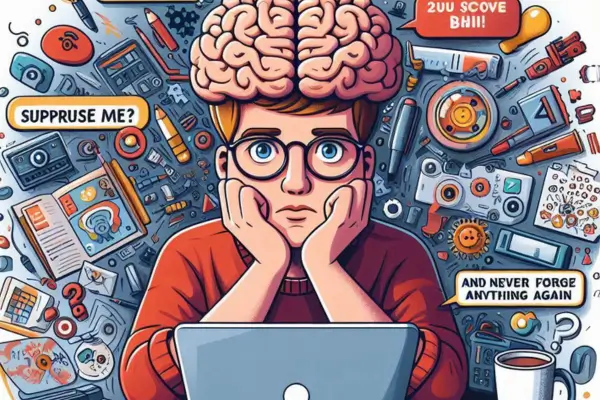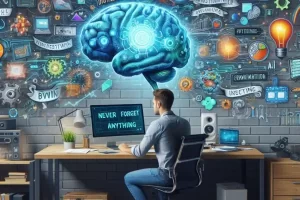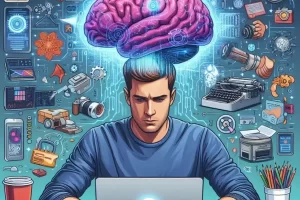Routines are the foundation of consistent progress. They shape how we start our mornings, focus during work, rest in the evenings, and show up every day — even when motivation is low. But routines often fall apart without structure, flexibility, and reflection.
With the help of a second brain and artificial intelligence (AI), you can build routines that actually stick — and evolve with your lifestyle, energy, and goals.
In this article, you’ll learn how to create, refine, and sustain personal routines using your second brain and AI, turning habits into systems that support lasting momentum.
Why Routines Fail Without a System
Most people try to follow routines based on:
- Overly rigid plans
- Inspiration from others (but not adapted to their life)
- Willpower instead of automation
- Forgetting to reflect on what’s working or not
As a result, routines often:
- Break after a few days
- Don’t adapt to your energy or season
- Cause guilt instead of motivation
- Get abandoned entirely
With a second brain and AI:
- You build routines into your daily and weekly workflow
- You track and adapt based on your reality
- You’re guided by data and reflection — not guilt
- You make progress with consistency, not perfection
Define the Purpose of Each Routine
Start by deciding why you want a routine and what it should support.
Examples:
- 🧘 Morning routine → focus, calm, intention
- 🛠 Work startup → clarity and task activation
- 🔁 Afternoon reset → energy management
- 📦 Work shutdown → transition to rest
- 💤 Evening routine → relaxation and digital detox
- 🧠 Weekly review → planning and reflection
Ask AI:
“Suggest a 15-minute morning routine that supports creativity.”
“What kind of routines would help me manage stress and focus during the workday?”
“Build a workday structure based on my energy highs and lows.”
Now every routine has a clear goal and function, not just a checklist.
Build and Store Routines in Your Second Brain
Create a dedicated “Routines” section with templates for each part of your day or week.
For each routine, include:
- 📝 Steps or phases (with time estimates)
- 🔗 Linked habits, tools, or notes
- 🧩 Optional variations (for weekends, low energy, etc.)
- ✅ Tracking or completion checklists
- 🎯 Why this routine matters
Let AI help:
“Build a morning routine template for high-focus days.”
“Generate a 5-minute end-of-day reflection to include in my evening routine.”
“Suggest ways to simplify this 9-step routine without losing impact.”
Now you have a central library of routines you can update and reuse.
Connect Routines to Your Daily Workflow
To make routines stick, integrate them into the tools you already use.
Ways to integrate:
- 📅 Add to your calendar or planner
- 📋 Include in your daily note or task dashboard
- 🔁 Use recurring templates or reminders
- 🔗 Link to goals, habits, and reflections
Ask AI:
“Add my morning and shutdown routines to my daily planning page.”
“Remind me to do my work startup checklist at 9 a.m. on weekdays.”
“Which routines support my top 3 goals this month?”
Now your routines are embedded in your daily system, not just intentions.
Track Your Routines Without Pressure
Tracking helps build consistency — but it should feel supportive, not stressful.
Use:
- ✅ Daily checkboxes or habit trackers
- 📈 Weekly dashboards for patterns
- 📓 Journals or logs for qualitative notes
- 🎯 Tags for wins, challenges, or adjustments
Let AI assist:
“Track which routines I completed this week.”
“Summarize how consistent I was with my evening wind-down routine.”
“What routines am I skipping most often, and why?”
Tracking gives you feedback, not just data.
Adjust Routines Based on Energy and Season
Your life isn’t static — and your routines shouldn’t be either.
Build alternate versions of routines:
- 🌞 High-energy version
- 🌧 Low-energy version
- 🧘 Weekend/slow days
- ✈️ Travel-friendly version
- 🛠 Focus sprint version
Ask AI:
“Generate a 3-step micro-routine for low-energy mornings.”
“Simplify my evening routine for nights when I work late.”
“What version of my planning routine fits during a busy travel week?”
This keeps your routines realistic, resilient, and kind.
Review and Evolve Your Routines Monthly
Use your second brain for a quick monthly routine review.
Ask:
- What’s working?
- What feels forced or outdated?
- What am I doing consistently?
- What small shift would make this easier or more enjoyable?
AI can guide your reflection:
“Analyze my habit and routine data — what’s helping my productivity?”
“Suggest how to improve my work shutdown routine based on my energy logs.”
“What should I remove or rework in my weekly planning ritual?”
Your routines should grow with you — not hold you back.
Use AI to Build New Routines on Demand
Whenever a new goal or challenge shows up — build a routine around it.
Scenarios:
- 🧠 Learning a new skill
- 🏋️ Improving health or fitness
- 🧘 Enhancing mindfulness or recovery
- 💼 Starting a new job or project
- 📱 Reducing screen time
Ask AI:
“Create a 10-minute writing warmup routine.”
“Build a weekly prep routine for launching my newsletter.”
“Design a routine to transition from work to family time.”
Now you can respond to change with structure, not stress.
Real-Life Example: The Grounded Professional
You’re juggling work, health, family, and personal growth.
With your second brain and AI:
- You’ve designed 5 core routines (morning, work start, deep focus, shutdown, and Sunday planning)
- Each routine lives in a structured, editable template in Notion
- AI helps adapt routines based on energy, season, and mood
- You use a daily planner that automatically reminds you of your routines
- Monthly check-ins help you evolve routines instead of abandoning them
You no longer rely on motivation — you’ve built systems that support your best self.
Final Thoughts: Routines Are Your Foundation for Flow
When you build great routines, you free up energy for creativity, connection, and growth. With a second brain and AI, you can:
- Design routines that reflect your values and goals
- Track and adapt based on your real life
- Stay grounded, even during chaos
- Turn repetition into resilience
- Make progress with clarity — not pressure
Don’t just chase productivity.
Build rhythms that carry you — consistently, intentionally, and sustainably.




